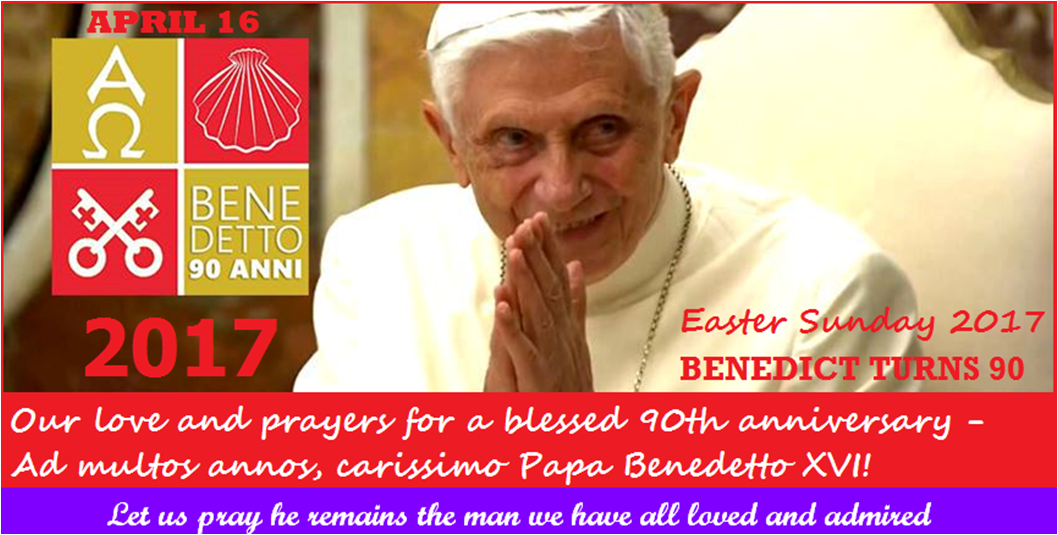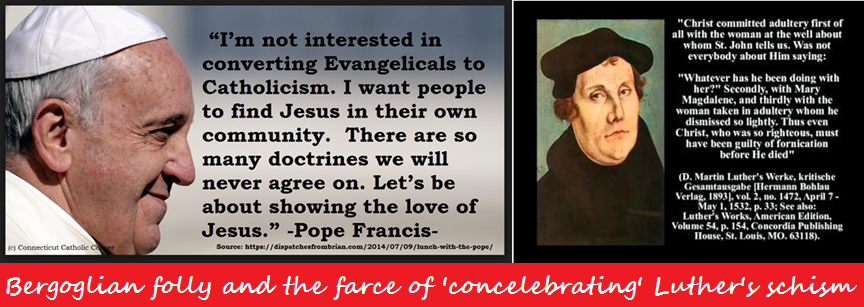
ALWAYS AND EVER OUR MOST BELOVED BENEDICTUS XVI

 Belatedly, here is that Tosatti post on Luther that was 'locked up' when my computer switch malfunctioned... It carries
Belatedly, here is that Tosatti post on Luther that was 'locked up' when my computer switch malfunctioned... It carries
a 10/31/17 headline round-up which I used as the take-off for the article on Luther.
10/31/2017 headlines

 On Luther (1):
On Luther (1):
What is there to celebrate?
Translated from

October 31, 2017
Today marks 500 years since the official start of what would go down in history as the Protestant ‘Reformation’ – which caused some of the major wounds in the body of Christianity. And this blog would like to ‘remember’ this moment in two ways.
The first is the review of a new book that examines the political, historical and religious universe of Martin Luder (it appears Luther was a pseudonym, the vulgar form of Eleutherius, meaning ‘free’). The book makes it evident to a dispassionate reader that it is not for us, as Catholics and as Christians, to celebrate this event.
The second is an interview with the newspaper
Die Zeit of a leading Lutheran pastor from Germany who claims to know Pope Francis well enough for him to get early morning telephone calls from Casa Santa Marta from time to time. [The article title is in itself a story, so I will anticipate Tosatti a bit here, if only graphically:]
 Now for the book review:
Now for the book review:
 Martin Lutero: Il canto del gallo della Modernità
Martin Lutero: Il canto del gallo della Modernità
[Martin Luther: The cock’s crow (dawn) of modernity]
On October 31, 1517, Martin Luther published his 95 theses against indulgences. His gesture began a global movement that has passed into history as the ‘Reformation’.
Stilum Curiae wants to mark this date briefly with a review of a small but very lucid and important book by Danilo Castellano, emeritus president of the Faculty of Jurisprudence at the University of Udine (northeastern Italy), a corresponding member of the Academia Real de Sciencias Morales y Politicas of Spain, and an honorary member of the same country’s Academia Real de Jurisprudencia y Legislacion.
His book considers Martin Luther to have heralded the dawn of the modern era. He deliberately ignores the major religious questions pondered by the former Augustinian monk, although some religious aspects are necessarily treated more or less in depth. But the focus of his study is
the nature of the Reformationas primarily philosophical and political, since it cannot be ignored that the Reformation – which as Cardinal Mueller recently said, a view Castellano takes, was not mere reform but a true and proper revolution – was, from the very beginning, closely tied to the politics of the era (especially in the German states).
Castellano says that, for example, “Kierkegaard, who was Lutheran, faulted Luther for
his strong embroilment in worldiness which led him to degeneracy.”
[Hmm, we could apply that, too, to ‘Luther’s true heir’, couldn’t we?]
Castellano reiterates that
the Reformation was not a reform “but a revolt against the Church: It was the creation of a ‘new’ church on the basis of a ‘new’ doctrine that remained open to ‘new’ perspectives”. [Is this how future historians might describe Bergoglio’s pontificate?] I find this a very important emphasis, now that part of the Catholic Church - those elements which are hardly lucid or rational - is living through the inebriation of an emotional ‘global group hug’.
And
he calls Luther’s revolution ‘a virtually integral gnostic revolution’. But on the basis of this revolution, Castellano asks, is it at all possible to ‘rehabilitate’ Luther who would then conceivably become the inspiration for eventual reforms to the spiritual life as well as to the governance of the Catholic Church?
Some cardinals – Cardinal Reinhard Marx of Munich, for example – have actually said so. And even in the Church in Italy, there are those who say that the Holy Spirit had inspired Luther! Castellano’s answer is NO, as well as to other circumstances that appear propelled more by eager and ill-considered bonhomie rathr than mature reflection.
In the course of her long history, the Church has lived through numerous reforms, from within. And the so-called Counter-Reformation “was not a mere sterile opposition to the Protestant Reformation, but rather a program and an ongoing work of intense Church renewal in doctrinal faithfulness to the deposit of faith received from Christ, safeguarded and transmitted onwards by the Church, even on the educational level”.
Castellano drastically affirms that
“To confuse the Lutheran reforms with the always necessary continuing self-reform of the Church is an error - the fruit of ignorance and/or bad faith”. Which is a consequence of being blind to ‘the gnostic character of the Reformation’.
Another important point he makes is on freedom and the law, in which it would seem that laws are seen as an obstacle to freedom
[How Bergoglian! Or perhaps since Bergoglio is a Jorge-come-lately half a century after Luther, I should learn to remark henceforth when the pope comes up with one of his trademark heterodoxies/near-heresies, ‘How Lutheran!’]: “Evangelical freedom would destroy all laws, including human laws”.
But this reading of Lutheran thinking seems to be balanced on the other hand by the fact that “the question of law is central in Lutheran doctrine… Luther assignes to the law an omnipotent power which centuries later would be proclaimed unequivocally during the Enlightenment.”
[How conditioned we are to names that were given self-importantly by the dominant thinkers of the day to the ‘Reformation’ and to the ‘Enlightenment’ when they were anything but!]
According to Castellano,
Luther and his new doctrine represented the cock’s crow (dawn) of modernity because in his theoretical elaboration of Lutheranism, he sows the seeds for the social and political development on the centuries to come, culminating in Marxism and Nazism.
And among these seeds, there is the pluri-significant use of the word ‘people’.
[Aha! Bergoglio’s idea of ‘pueblo’ as a mythical reality, as self-contradictory as that term might be – but by which he wants to elevate the idea of ‘the masses’ as a powerful force in which the whole is greater than the sum of its parts.] “It is a profoundly revolutionary concept of ‘people’ because its roots are gnostic. But which ‘people’ is meant? Principally, that which found a formal elaboration at the time of the French Revolution, which in itself was one of the consequences - and perhaps the principal one – of the Reformation on the political level”.
In religion, the population of believers make up a church – but
“for Luther, they are an association, not a foundation. And as in any association, its nature and its purpose, even its very constitution, depend on what the members decide, on their values. It is obvious how remote this idea is from the Catholic concept of the Church as the mystical Body of Christ. And yet, for Luther, ‘the universal church’ “would be nothing more than an association of associations [a federation] along with their base communities”. [And the church of Bergoglio is precisely aiming for this with its ‘decentralization’ of papal powers (including those that are not decentralizable) and the autonomy it is giving to bishops’ conferences. Which would make his church obviously no longer ‘catholic’, but a federation of autonomous ecclesial fiefdoms, each determining their own doctrine, pastoral practices and diocesan or national laws. How could any rational Catholic even think of doing this? I suppose the answer is that Bergoglio is not necessarily rational nor Catholic.]
Also interesting is how Castellano underscores Luther’s principle that
“whatever is common to everyone cannot be usurped by any individual until he takes responsibility for the community”, which is fraught with consequences, especially political ones. This principle gave rise to Hegel’s statement that ‘What is real is rational’ – which is a way of saying that “Whoever is stronger is right”, because it is the strong and powerful who can most affect ‘reality’.
Luther himself in his writings affirmed that all of history ought to be sacred because “it is God himself who hangs or punishes, he beheads, strangles and makes war”. Indeed, in the Peasants' War
[a widespread popular revolt in the German-speaking areas of Central Europe from 1524 to 1525. It failed because of the intense opposition by the aristocracy, who slaughtered up to 100,000 of the 300,000 poorly armed peasants and farmers], Luther was on the side of the winners, even while acknowledging that the peasants’ demands were right. How much this predominance of the community’s motivations influenced the history that followed is evident.
I will stop here, but I fervently advice you to read this agile history in order to consciously confront the avalanche of rhetoric that being dumped on us on the 500th anniversary of the start of Luther’s revolution.
[Modificato da TERESA BENEDETTA 09/11/2017 06:07]